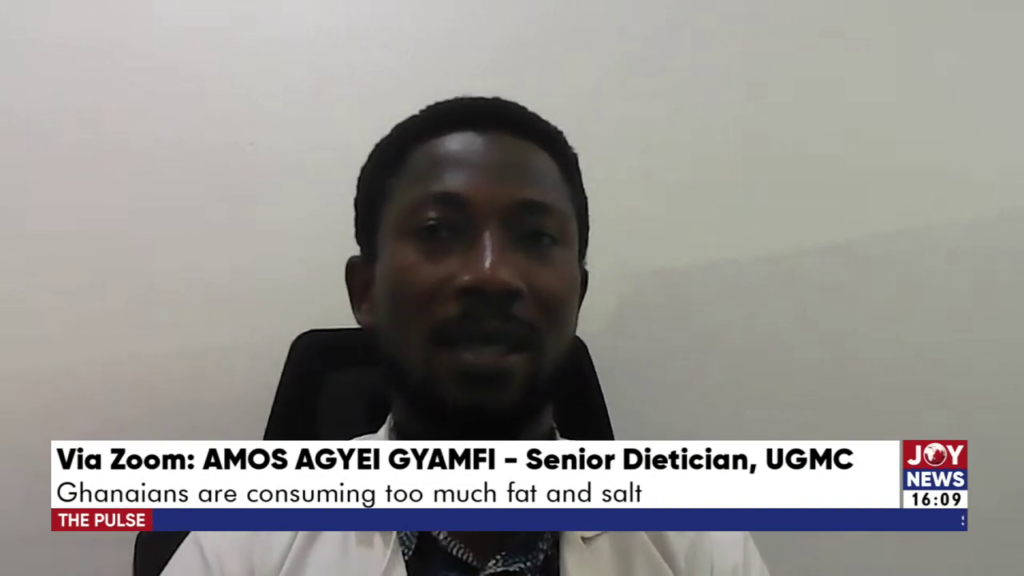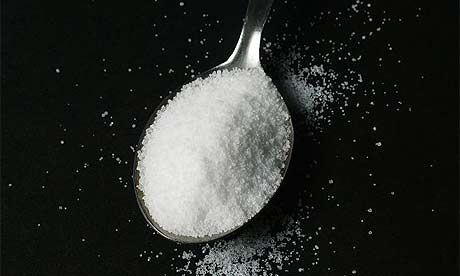Senior dietician at the University of Ghana Medical Centre, Amos Agyei Gyamfi, is advocating for moderation in the consumption of salt.
According to him, no more than one teaspoon of salt in day will reduce the risk of hypertension.
Speaking on the importance of dietary management in controlling blood pressure, Mr Gyamfi emphasised that excessive salt intake is a significant contributor to the development of hypertension.
Mr. Gyamfi explained that high salt consumption leads to increased blood pressure, which in turn raises the risk of cardiovascular diseases such as stroke and kidney failure.

“For your cardio-protective health, a meal good in drains and less salt. In Ghana, someone’s pinch of salt might be more than five grams. Technically, on a daily basis, it’s recommended that you have about a teaspoon of salt for the whole day, and it’s also advisable to put salt on the table. We shouldn’t have the excess of the oils,” he indicated.
The dietician's advice aligns with global health guidelines, which also suggest limiting salt intake to minimise the risk of hypertension and associated health complications.
Speaking to the host of The Pulse, Elton Brobbey, the dietician advised that individuals should be mindful of hidden salt in processed and packaged foods, which can contribute to higher salt consumption without realising it.
In addition to reducing salt intake, Mr. Agyei Gyamfi recommended a balanced diet rich in fruits, vegetables, whole grains, and lean proteins, combined with regular physical activity, to maintain optimal blood pressure and overall health.
He believes our local foods are rich in nutrients, and westernising of our diets exposes us to cardiovascular diseases.
“As Ghanaians, we shouldn’t be mordenising our diet by following western diets. Our local diets are good for us. It’s just about what goes into it. Ghanaians are consuming too much fat and salt. Too much of the processed foods. We are avoiding natural and fresh foods. Those are the challenges we are facing now,” Mr. Gyamfi said.
The healthcare professional is of the firm view that by adopting these dietary changes, Ghanaians can take proactive steps towards better health and a reduced incidence of hypertension.
Latest Stories
-
Court to hear matter between Dram Oil, Alfapetro Ghana Limited in October
1 hour -
2 arrested with concealed 86 parcels of suspected cannabis
1 hour -
Compassion International Ghana, environmental activists urge action as children are exploited into illegal mining
1 hour -
TikTok star Khaby Lame leaves US after being detained by immigration officials
3 hours -
Software engineer remanded over alleged theft of two rented cars
3 hours -
Cab driver jailed 15 years over defilement
3 hours -
Ex-convict jailed 3 years for stealing three guns
3 hours -
Security Committee adopts measures to control armed robbery on Sunyani-Atronie stretch
3 hours -
Tyler Perry faces $260 million lawsuit over alleged sexual assault by actor
3 hours -
Two fined GH¢1,560 for stealing, dishonestly receiving
4 hours -
19 suspects arrested in Kasoa Dominase over drugs and robbery
4 hours -
CPPA demands justice for murdered pharmacist, declares mourning
4 hours -
Notorious Nigerian robber convicted in Sekondi
4 hours -
6 persons busted over alleged fake $1m discharged
4 hours -
Volta Region sets the pace in renewable energy innovation – Regional Education Director
5 hours

